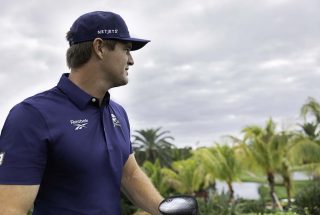March 7 marks the 100-year anniversary of the most captivating moment in Fayetteville’s baseball history: Babe Ruth’s first professional home run. Meanwhile, the date’s significance brings to mind another “swinging” game for which the area has become even more noted through the years – golf.
FAYETTEVILLE, N.C. (March 2014) – A fact likely best known by baseball aficionados: the legendary Babe Ruth’s first professional home run was belted in Fayetteville.
Ruth’s notorious first dinger as a pro – during spring training with the Orioles – took place on March 7, 1914 at Fayetteville’s Cape Fear Fairgrounds. The intra-squad exhibition game led to the recently signed George Herman Ruth to be dubbed “The Babe” for becoming Baltimore manager Jack Dunn’s new young phenom. And his innate power – the bat boy that day claimed the ball was swatted so far that Ruth was able to trot around the bases before it was retrieved – translated into an ability to knock the cover off a golf ball; although maybe not as consistently fine as the big man might have liked.
“Babe was just as powerful at golf as he was at baseball,” wrote Eric Yoder of Washington’s GolfStyles Magazine, “although accounts of regular drives of 350 yards and more might best be taken with a grain of salt, given the equipment of the day. But with an extremely top-heavy build, it was almost inevitable that Ruth would be a slicer… But Ruth had his good moments on the course as well. He had two career aces and a double eagle, and once closed a round birdie-birdie-eagle-birdie.”
Ruth’s dynamic persona and immense power would no doubt blend in well with the Fayetteville golf scene if he were around today. Several area courses are of major-league caliber and many holes would have likely “fit the eye” of one of the greatest sports figures ever.
Still, you don’t have to be of Ruthian stature to enjoy the variety of challenges Fayetteville golf has to offer – even short knockers can enjoy precision shots over cypress tree-laden ponds and native grasses, between classic Sandhills bunkers, and through tight, tree lined chutes of trees. But if you are a big hitter and like to cut the ball from the left side or draw the ball from the right, here are some holes that should have you licking your chops as you step up to the tee box on your next trip to the “Swatville of the South.”
Holes Nos. 5 and 13 at Anderson Creek Golf Club
An upscale layout by Davis Love III, the 7,215-yard course was his first foray into design in his native state and was named North Carolina’s “Best New Course” for 2001. It is located in Spring Lake, just minutes from Fort Bragg and not far from downtown.
According to PGA Professional Jon Hockaday (who actually has an old black and white photo of Ruth playing golf hanging above his office desk), Babe would have loved these two Anderson Creek offerings in particular.
“If he hit his drive 350 yards with a cut, he could drive the green on either one,” says Hockaday. “No. 5 (at 404 yards from the tips) is a hole that turns left and goes downhill from that point to the green. He would have to sort of hit it over the corner of the trees and get a bounce, but he could do it.
“No. 13 (at 335 yards from the tips) might be a little tougher as it is fairly flat and the green actually rises a little from the teeing area. It is a straightaway hole with the green tucked a little to the left. His best shot to reach either would be during the summer when every course around here gets a little firmer and faster.”
Holes Nos. 11-13 at Bayonet at Puppy Creek
This uniquely-named and big-time maintained layout by Willard Byrd opened in 1995 in Raeford. It stretches to 7,021 yards. The course is a product of the Carolina Turf Company, thus guaranteeing strong conditions and challenges fit for the multitude of competitive tournaments that have been held there in the past, including some mini-tour events.
Though No. 10 is probably the most driveable par 4 on the course at 356 yards, it is fairly straight. According to general manager Dyrck Fanning, the trio of holes Nos. 11 through 13 really set up well for a lefty’s power fade.
“The most inviting,” says Fanning, “is probably No. 11. It is a dogleg left uphill with trees on the left and trees way right. Like many out here, the fairway on No. 11 is generous. If he were to crank one here, however, he’d probably end up just short of the green and his work would still not be done. The green at No. 11 is one of the toughest on the course. Protected by a bunker on the left, it is two tiered with a four-foot rise from front to back in the middle of it. Nos. 12 and 13 also move a little right to left and they shape perfectly for a little cut (or right-side draw).”
Hole No. 6 at Gates Four Golf & Country Club
An original Willard Byrd design from 1967, the 6,895-yard course has been modernized in recent times by Dan Maples and Kris Spence. It is located just south of the city and winds its way across nice elevation changes in full view of a large community lake. It also features a stately three-storied clubhouse and dining at JP’s Bar and Grill.
The hardest handicapped hole on the course is the 408-yard, par-four No. 6. Though best conquered with two precise shots across a hard dogleg left, the hole begs for a Ruthian high-hard fade or a big-bopping draw from the other side of the plate.
“If he took it over the trees, No. 6 would be a neat hole for him,” says Gates Four general manager Kevin Lavertu. “But it would be a highly risk/reward shot. A bunker runs right through the middle of the hole at the end of the fairway before it doglegs and there’s OB straight and OB left. If he pulled the shot off, he’d have only about 50 to 75 yards left and be flipping a sand wedge in.”
Hole No. 4 at Cypress Lakes Golf Course
Robert Wilson is the PGA head golf professional at Cypress Lakes in Hope Mills, just off I-95 Exit 41 and one of the more memorable layouts not only around Fayetteville but also in the state. He gets to direct players across a 6,943-yard layout that combines challenging and scenic golf along with an Okefenokee Swamp-like feel on certain holes.
One of the harder handicapped holes at his course is the 437-yard No. 4, due to its length, relative tightness and its hard turn from right to left. While a Ruthian block would likely leave the power hitting in the trees or even deeper into the swamp, a properly maneuvered cut over trees would leave the player with a shortish approach shot to the pin.
Other doglegs angling towards left field at the history-laden track include the par-5 No. 2 at 500 yards and the par-5 No. 18 at 510 yards.
Fayetteville golf packages at these four courses are available at www.MaplesGolf.com or 800-889-5323. Additional info at www.VisitFayettevilleNC.com/golf.
Contact:
Martin Armes, 919-608-7260, martinarmes@nc.rr.com
Brad King, 336-306-9219, king@bradkingcommunications.com



